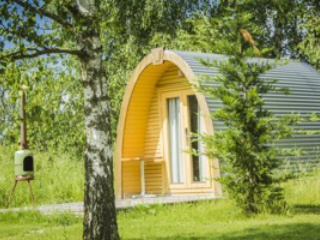
-
 publication: 8 November 2022
publication: 8 November 2022
On the 26th of September the NBTC Tourism Top took place. The top was dedicated to presenting the agenda for climate neutral tourism in the Netherlands, a document that has been developed by NBTC in collaboration with scholars and the industry (https://www.nbtc.nl/nl/site/download/download-op-weg-naar-klimaatneutraal-koersdocument.htm?disposition=inline, an English version will follow soon).
Elena Cavagnaro contributed to the agenda from her expertise on sustainable tourism and nudging pro-environmental behavior.
The Dutch agenda is rooted in the Glasgow Declaration on Climate Action in Tourism (https://www.oneplanetnetwork.org/sites/default/files/2021-11/GlasgowDeclaration_EN_0.pdf). It follows the Glasgow Declaration pillars, namely research and accountability, lowering emissions, strengthening of ecosystems, financing, and partnership. Behavior is a new component to it that has been interwoven in the existing pillars because, as the IPCC reckoned, above 60% of the needed CO2 reduction depends on changing our behavior.
Below some take outs from the meeting.
The Top started with some video showcasing Flevoland as a cradle for sustainable entrepreneurship in tourism such as NETL (https://www.netl.nl/, see image), the music festival Lowlands and the restaurant and event organizer Boerkok that only cooks with local ingredients from Flevoland (https://www.boerkok.nl).
Then the minister of economic affairs and climate, Micky Andriaansens, stressed the necessity for climate neutrality in tourism while recognizing that we seem to live in a time of permanent crisis. Alongside climate, we face water pollution, a nitrogen crisis, high inflation, the energy transition and particularly in tourism and hospitality shortage of personnel. Interesting was to hear her referring to Schiphol as a “problem”. Usually the national airport was seen as an opportunity or at least a necessity. Framing it as a problem opens up the discussion around limiting flying and a carbon tax on airplane tickets.
Reinier van der Berg, meteorologist, shared his hope for the transition toward a more sustainable future while acknowledging his preoccupation with the current human footprint. As most of the readers know, we leave as if we have three planets. He referred to the shortest summary of the IPCC report on climate change: widespread, rapid, intensifying. To quote just an example: over ten years, much earlier than expected, global warming will have reached 1.5?. The Paris agreement aims at limiting it to well below 2.0?.
Van der Berg briefly showed that the rapidity of climate change has not only consequences for melting ice caps, stronger typhoons, and floods, but also for tourism destinations. Too warm or too rainy destinations will no longer attract tourists. Think about South Italy this summer with its 40?.
The window of opportunity is closing but is not yet closed. There is still a route to a livable Earth. Van der Berg showed five pillars for this future alongside getting to zero emission in 2050 and negative emission afterwards: strengthening biodiversity so that CO2 is fixed in trees, wetlands, and the like; saving energy including the protein transition; reuse of products and materials aiming at circularity at least as design for recycling; sustainable energy production, including electrification of autos and warming /cooling); and fair and true pricing including taxing fuel for airplanes i.a. because we do pay taxes on a train ticket.
When listening to van der Berg I was thinking: how would hospitality look like if we follow these principles? To start with, a hotel or restaurant could green its surroundings by planting indigenous species, offer as a standard a vegetarian menu, choose recycled materials for tables, chairs and the like and offer an electric charging station fuelled by solar panels. Hospitality will and should operate as a guest on earth.
Ewout Versloot, NBTC workgroup climate neutral tourism, presented and explained the Agenda for climate neutrality of tourism in the Netherlands. He stressed three main threads, starting with innovation. Innovation is needed, particularly for mobility, but is not a silver bullet. We also need to lower our impact. The second thread is behavioral change and the intention - behavior gap. The third is structure for collaboration. Collaboration is needed yet the way tourism is organized and financed is not in line with the climate challenge that we are facing. He concluded by pointing at five actions that all actors in tourism could take: start now and do not wait; take leadership particularly as policy maker by setting new norms; reach out and help each other; experiment with nudging; intensify partnerships.
In the afternoon so called ‘deep dives’ took place, one of which was dedicated to behavior. As a panelist I tried to convey that behavioral change of individuals is indeed one of the keys to a more sustainable future but not the only key. Interesting was that most participants to the ‘deep dive’ recognized the need to take responsibility as entrepreneur or policy makers even if the guest does not ask for it. This is a very different stance than the one the industry took eight years ago when I started conversing with general managers about sustainability . Back then, hospitality managers kept repeating to me that they would never move towards sustainability if the guest was not asking for it.
The ‘deep dive’ following the one on behavior was about transportation, with colleague Paul Peter from Buas and Hedwig Sietsma from KLM. One of the take outs of the discussion is that climate neutral tourism, if achievable, is not by definition sustainable because it does not address negative impacts on destinations and communities. Moreover the typical excuse for long haul traveling, that it brings peace by letting people from different cultures meet, can no more be assumed as something that happens by default. Otherwise, Dutch ‘bitterballen’ would not be such a hit in the Garda lake in North Italy. Finally, what was rather frightening to me, is that airlines still think they will grow exponentially in the coming years and represent 15% of global carbon emissions by then. This while at the same time we need to reduce emissions to zero! Undoubtedly there is still a long way to travel to align all actors in hospitality and tourism to the need to develop tourism sustainably.
Elena Cavagnaro




 Back to overview
Back to overview

